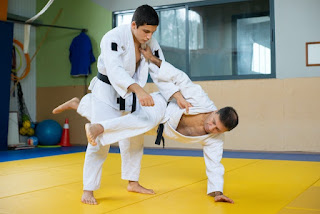Wrestling, judo, and jiu-jitsu are grappling martial arts that involve controlling and manipulating an opponent's body, rather than striking with fists. These arts have numerous benefits compared to fighting with fists, both in self-defence situations and in combat sports like mixed martial arts (MMA). In this article, we will explore the benefits of wrestling, judo, and jiu-jitsu over fighting with fists.
Physical fitness: Wrestling, judo, and jiu-jitsu require a high level of physical fitness. The intense training and conditioning involved in these martial arts can improve strength, endurance, flexibility, and agility. This increased physical fitness can translate to improved overall health and wellness.
Practical self-defence skills: Wrestling, judo, and jiu-jitsu focus on grappling techniques that allow a person to control and neutralize an opponent without striking. These skills can be highly effective in self-defence situations where striking an attacker could result in legal consequences. Moreover, grappling techniques are often effective against larger or stronger attackers, allowing a smaller or weaker person to defend themselves.
Improved mental discipline: Wrestling, judo, and jiu-jitsu require a great deal of mental discipline and focus. Practitioners must learn to stay calm and focused under pressure, to control their emotions and impulses, and to make split-second decisions. This mental discipline can translate to other areas of life, such as school or work, where focus and concentration are necessary.
Competitive opportunities: Wrestling, judo, and jiu-jitsu offer numerous competitive opportunities. These martial arts are often practised as combat sports, with competitions ranging from local tournaments to national and international events. Competing can provide a sense of accomplishment and can motivate a person to continue training and improving.
Lower risk of injury: While grappling arts can be physically demanding, they are generally safer than striking arts like boxing or kickboxing. In grappling arts, there is less risk of head trauma and brain injury, as well as less risk of broken bones or other serious injuries.
Increased body awareness: Wrestling, judo, and jiu-jitsu require a high degree of body awareness and control. Practitioners learn to move their bodies in a precise and controlled manner, which can translate to improved coordination and balance in other areas of life.
Respect for opponents: Wrestling, judo, and jiu-jitsu have a strong emphasis on respect for opponents. In these martial arts, there is a culture of mutual respect, where practitioners are taught to treat their opponents with dignity and respect, even in competition. This emphasis on respect can help build stronger relationships both on and off the mat.
Improved problem-solving skills: Wrestling, judo, and jiu-jitsu require a great deal of problem-solving. Practitioners must learn to read their opponents and anticipate their movements, find and exploit weaknesses, and adjust their techniques on the fly. These problem-solving skills can translate to other areas of life, such as work or school, where creative thinking and problem-solving are necessary.
Community and social support: Wrestling, judo, and jiu-jitsu often have strong communities of practitioners who support and encourage each other. These communities can provide a sense of belonging and social support, which can be beneficial for mental health and well-being.
Improved confidence: Wrestling, judo, and jiu-jitsu can provide a sense of confidence and self-assurance. Practitioners learn to trust their bodies and their abilities and to face and overcome challenges. This increased confidence can translate to other areas of life, such as work or relationships, where confidence and self-assurance are important.
In conclusion, wrestling, judo, and jiu-jitsu offer numerous benefits compared to fighting with fists.
